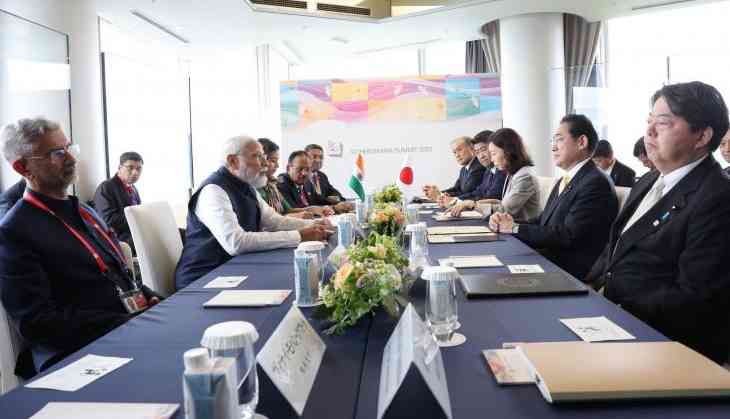PM Modi meets Japanese counterpart Kishida in Hiroshima

Hiroshima [Japan]: Prime Minister Narendra Modi met his Japanese counterpart Fumio Kishida in Hiroshima on Saturday and discussed ways to enhance "India-Japan friendship across different sectors including trade, economy and culture."
PM Modi is attending the G7 Summit under the Japanese Presidency at the invitation of PM Fumio Kishida.
"PM @narendramodimet PM @kishida230 in Hiroshima. Both leaders discussed ways to enhance India-Japan friendship across different sectors including trade, economy and culture," the Prime Minister's Office (PMO) said in a tweet.
"I want to thank you for inviting India to the G7 Summit. Your (PM Kishida) visit to India was a memorable one. It is a delightful moment for me as the Bodhi tree I gifted you have been planted by you in Hiroshima, I believe India-Japan relations will grow with the growth of this tree," PM Modi said in Hiroshima as he congratulated Kishida on the successful presidency of G7.
The G7 leaders are currently in Japan to attend the G7 Summit scheduled to be held in Hiroshima from May 19-21.
Notably, Japan assumed the G7 Presidency in 2023. The Summit is an international forum held annually for the leaders of the G7 member states of France, the United States, the United Kingdom, Germany, Japan, Italy, and Canada (in order of rotating presidency), and the European Union (EU).
Prime Minister Narendra Modi who arrived in Hiroshima, Japan to attend the G7 Summit, on Friday, interacted with members of the Indian diaspora here.
Members of the Indian diaspora in Japan gathered at a hotel in Hiroshima. They cheered "Bharat Mata ki Jai" and "Vande Mataram". They also raised slogans hailing PM Modi. Hiroshima is the first leg of PM Modi's three-nation visit during which he will also visit Papua New Guinea and Australia.
India has been invited as a guest country for the G7 summit. The broad terms of the G7 summit preferences regarding their outreach with the invited guest countries are nuclear disarmament, economic resilience and economic security, regional issues, climate and energy and food and health and development.

